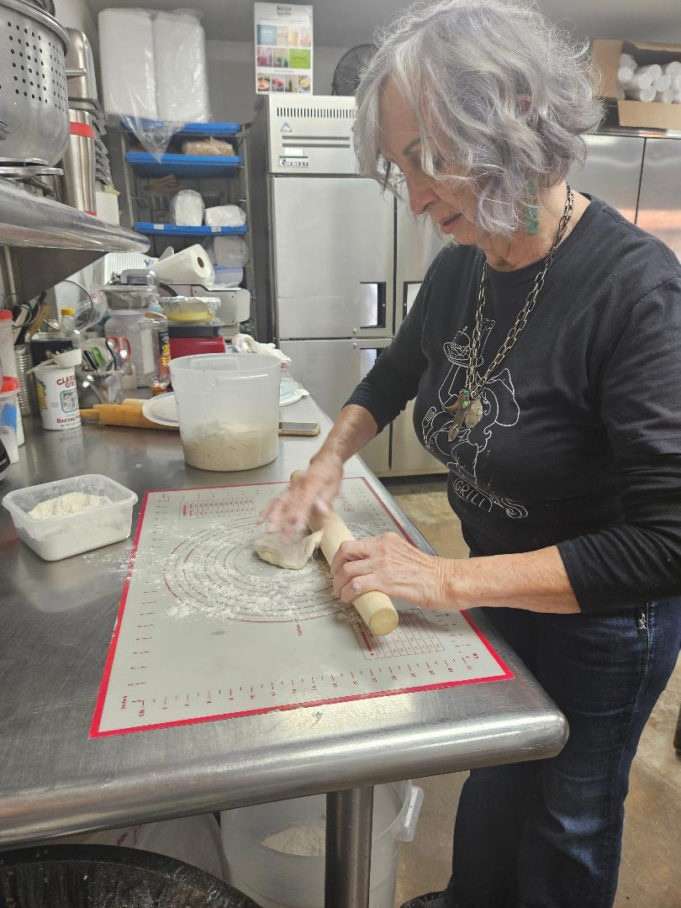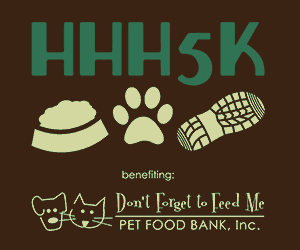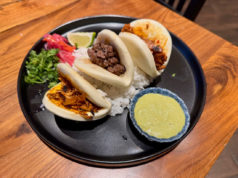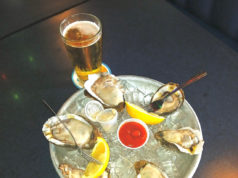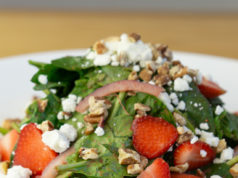Next to a dozen small, white mounds, the caption says, “It’s Native American Heritage Month, and we’re rolling in the dough.”
Haha.
The post was by Hooker’s Grill, a Stockyards establishment co-founded seven years ago by two Native Americans. Mother Kathryn Hooker and daughter Ruth Hooker opened their small, cozy, open-air spot primarily to sell onion burgers and a popular Native American treat called the Indian Taco, hence the dough.
Food, Ruth said, is a great way to start a conversation about culture, and at Hooker’s, the chit-chat often revolves around Ruth and Kathryn’s heritage: Choctaw Nation of Oklahoma.
The Indian Taco’s golden fried bread is a staple for many native peoples, Ruth said, but its origins hark back to a dark time in history.
“If you go to any state that has a strong Native presence like Oklahoma or New Mexico, then this is as common for the people there as burgers,” she said. “We eat this for breakfast, lunch, and dinner. Even though fried bread is common among Indian people, it came out of a bad situation. [The government] was rationing out food for the Native people [in Oklahoma] to survive after they were displaced.”
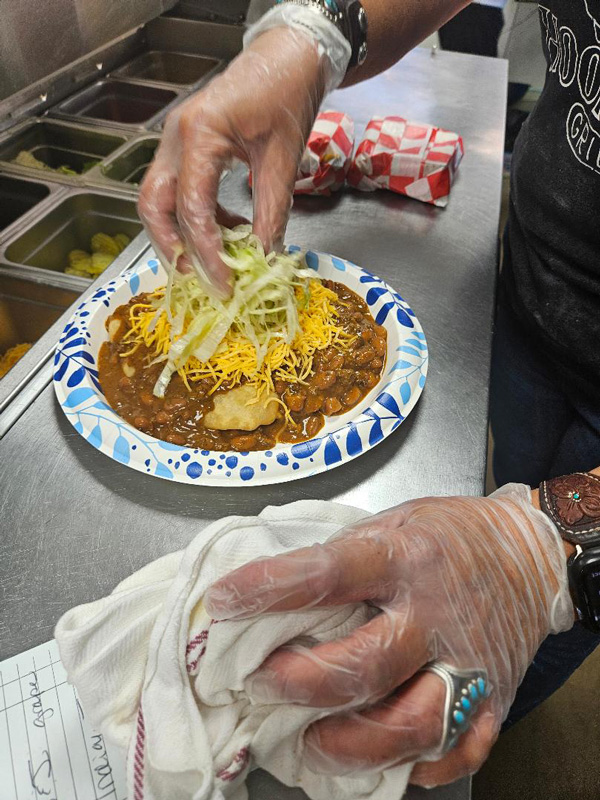
Photo by Edward Brown.
Frying the flour, she said, made the often dirty and/or bug-ridden flour palatable to the newly homeless Native Americans.
Ruth placed a circular piece of fried bread on a plate before piling on red beans and chili, diced lettuce and tomatoes, and shredded cheese. The bread — colloquially known as “fry bread” — had a thick, chewy texture, kind of like naan or a less pillowy funnel cake. The rich chili and beans added spicy, savory notes while the veggies and cheese provided nice harmonies. The fry bread also makes for a delightful and simple dessert when topped with powdered sugar and drizzles of warm honey.
Ruth said that if customer satisfaction and repeat business are any indication (and they are), the soft approach to teaching bits of Native American history through food is working. The mother and daughter also wear a lot of Choctaw jewelry, both to show pride in their culture and to catch the attention of customers. Ruth plans to add more menu items originating from the Choctaw tribe, although she may lightly spice them up with salt and pepper to appease contemporary Western palates.
Along with the Indian Taco and onion burger, Hooker’s is also known for their famous PB&J sandwich, which is as simple as it is delicious. The generously buttered Texas toast held the sweet and salty treat together commendably.
Onion burgers, an Oklahoma specialty still scandalously rare in these parts, do not come any tastier than at Hooker’s. The generous mound of juicy ground beef mashed with onions was slightly sweet and pungent while the pickles and mustard lent the perfect zing to the belt-buster.
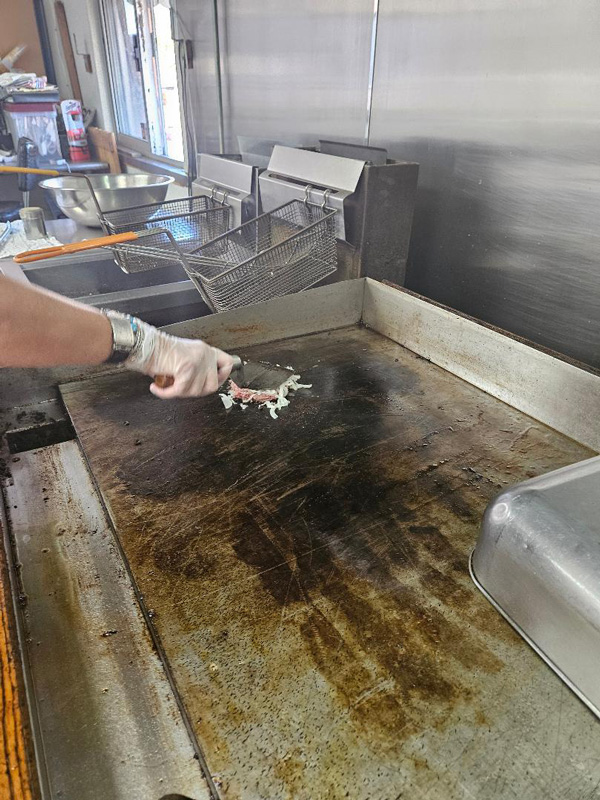
Photo by Edward Brown.
When customers ask about the Indian Taco or Native American jewelry, the co-owners are quick to tell the story of brothers George and Joe Davenport, two World War I code talkers who used the Choctaw language to handle military communications for the Allies. The 2002 movie Windtalkers celebrated the work of Navajo code talkers in World War II, but many Americans know little if anything about members of the Choctaw Nation who performed the same code-talking work decades earlier.
“The Choctaw language wasn’t written down,” said Kathryn, who is George’s granddaughter. “They would call a tanker truck a turtle, or a plane was a bird. The words didn’t literally mean the object, and [the Germans] couldn’t find a written language to compare it to. When World War II came, the government remembered the success” of the Choctaw translators.
In 2008, Congress passed legislation honoring the Davenport brothers and other Choctaw code talkers. Recognition of and rights for Native Americans have always come late in this country, Ruth and Kathryn said. After the war, George returned home to Finley, Oklahoma, where he farmed with his wife and raised five children before dying in 1950 at the age of 63.
Kathryn said she was 5 or 6 when George passed, but she remembers him as “quiet and stern.” Like many Native American men of his generation, he rarely opened up about his past or commented on the rampant racism faced by Native Americans like him at the time. It was only in recent decades that Indigenous tribes have made a concerted and collective effort to document and preserve their history and language. Choctaw, Ruth said, is taught in certain Oklahoma public schools, and the Choctaw Nation has made preserving the language a top priority.
“Our motto is faith, family, and culture,” Ruth said of the Choctaw Nation. “I don’t want people to forget our history. Any city or land was once the home of Native Americans. Everything started with them.”
After centuries of repression and attempted genocide at the hands of settlers and the U.S. government, Native Americans are now unapologetically loud and proud about their culture that has endured so much simply to survive to this day. George never taught his children the Choctaw language because Indigenous people felt ashamed of their heritage.
Ruth and Kathryn said they wish that he could have lived to see this country develop an appreciation for his service and the contributions of other Native Americans over the past centuries. If you go to Hooker’s, the duo says, please ask about George and Joe.
“Things have changed so much,” Ruth said. “I wish it would have been in his time.”
Hooker’s Grill
Onion burger $6.95
Indian Taco $14.50
PB&J sandwich $5.50
Fry bread $3



